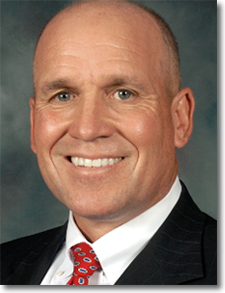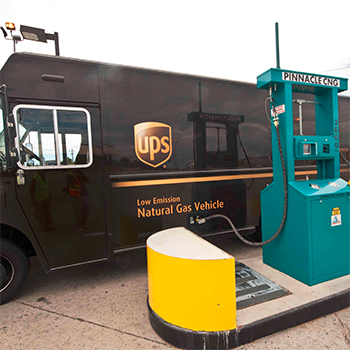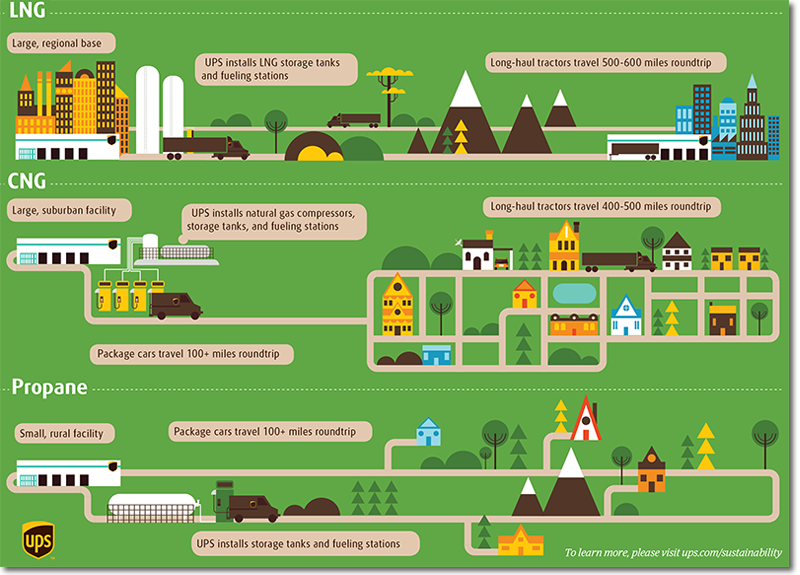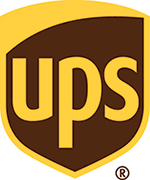UPS Building Additional 15 CNG Fueling Stations and Increasing CNG Fleet

When the deployments are completed, UPS anticipates its alternative fuel and advanced technology fleet will log more than 350 million miles per year, supporting the company's goal of driving one billion miles in this fleet by the end of 2017.
UPS has announced plans to build 15 compressed natural gas (CNG) fueling stations to support the purchase and planned deployment of 1,400 new CNG vehicles over the next year.
Twelve of the CNG stations will be in new natural gas vehicle deployment areas, and three will replace existing CNG stations with more robust, higher capacity equipment.
This purchase represents a nearly 30% increase to UPS’s current industry-leading alternative fuel and advanced technology fleet of 5,088 vehicles worldwide.
The CNG fueling stations and vehicle purchases are part of UPS’ ongoing commitment to diversify its fuel sources, implement a fleet infrastructure with lower tailpipe emissions and increase experience using alternative fuels in freight transport applications.

“UPS’s investment in a large scale alternative energy fleet has enabled the company to avoid more than 34 million gallons of conventional fuels since 2000,” said Mitch Nichols, UPS senior vice president of transportation and engineering. “Today’s CNG announcement demonstrates UPS’s plans to expand use of widely available natural gas. CNG is an important building block in our long-term fleet strategy and offers environmental and economic advantages.”
When the deployments are completed, UPS anticipates its alternative fuel and advanced technology fleet will log more than 350 million miles per year, supporting the company’s goal of driving one billion miles in this fleet by the end of 2017. This will displace approximately 54 million gallons of conventional diesel and gasoline annually while reducing total vehicle emissions. According to the U.S. Department of Energy, the use of natural gas instead of gasoline cuts greenhouse gas emissions by 6-11 percent over the fuel life cycle.(1)
UPS plans to deploy new CNG vehicles in 15 cities. The cities are Atlanta, Ga.; Charleston, W.Va.; Dallas, Texas; Denver, Colo.; Doraville, Ga.; Lenexa, Kan.; Lexington, Ky.; Montgomery, Ala.; New Orleans, La.; New Stanton, Pa.; Oklahoma City, Okla.; Port Allen, La.; Shreveport, La.; Richmond, Va., and Roanoke, Va. Currently UPS already has a total of eight CNG fueling stations in California, Colorado, Georgia and Oklahoma and operates CNG vehicles in Germany, the Netherlands and Thailand.
Using a “Rolling Laboratory” approach, UPS is one of the leaders in the industry developing the cleanest, most effective pathways to support the company’s effort to reduce emissions and dependence on fossil fuels while improving efficiency. The first package delivery company to introduce alternative fuel tractors into its fleet, UPS operates one of the largest private alternative fuel and advanced technology fleets in the U.S. Its fleet includes all-electric, hybrid electric, hydraulic hybrid, CNG, LNG, propane, biomethane and light-weight fuel-saving composite body vehicles.
Natural Gas in the UPS Rolling Laboratory
The UPS “Rolling Laboratory” strategy is to field-test new fuels and technologies in the UPS network, and then scale up the combinations of fuel source, facility location, vehicle type, delivery role, and infrastructure investment that deliver the best ROI. We are now scaling up such optimum ROI combinations for liquefied natural gas (LNG), compressed natural gas (CNG), and liquefied petroleum gas (propane).
UPS collaborates with various stakeholder groups to identify and promote transportation solutions that enhance the sustainability of emerging fuel choices. In 2012, UPS helped BSR (Businesses for Social Responsibility), launch Future of Fuels, a working group that promotes the development of lower-emission fuels for transportation. The group’s objective is to study the impacts of all fuel sources to help guide businesses in deploying alternative fuel vehicles in their fleets.
UPS’s sustainability initiatives are focused in four strategic areas: environmental responsibility, economic enhancement, empowered people and connected communities. In 2014, UPS became the second U.S. company (and only one in the U.S. transportation sector), to report at GRI G4 Comprehensive, the GRI’s highest standard of transparency, with the release of its 2013 Sustainability Report. The Sustainability Report covering 2014 is scheduled for release this summer.
(1) United States Department of Energy, “Natural Gas Vehicle Emissions.” Accessed 03/31/2015
Related: Algorithm Will Tell All UPS Trucks Where to Go

Article Topics
UPS News & Resources
Amazon Logistics’ Growth Shakes Up Shipping Industry in 2023 FedEx and UPS to Charge Additional Delivery Fees in Major U.S. Cities Parcel Experts Weigh in on New Partnership Between UPS and USPS Parcel experts examine the UPS-United States Postal Service air cargo relationship amid parcel landscape UPS To Become USPS’s Main Air Cargo Provider, Replacing FedEx UPS is set to take over USPS air cargo contract from FedEx GRI Impact Analysis – Parcel Spend Management 1.0 vs. 2.0 More UPSLatest in Transportation
Baltimore Bridge Collapse: Impact on Freight Navigating Amazon Logistics’ Growth Shakes Up Shipping Industry in 2023 Nissan Channels Tesla With Its Latest Manufacturing Process Why are Diesel Prices Climbing Back Over $4 a Gallon? Luxury Car Brands in Limbo After Chinese Company Violates Labor Laws The Three Biggest Challenges Facing Shippers and Carriers in 2024 Supply Chain Stability Index: “Tremendous Improvement” in 2023 More Transportation














